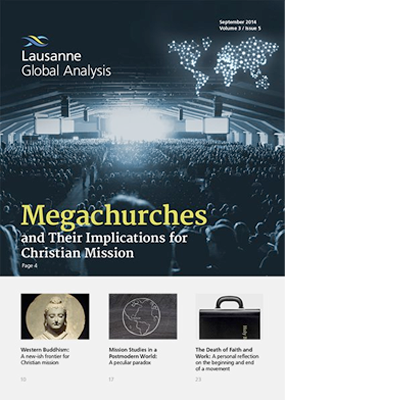Welcome to the September issue of Lausanne Global Analysis. We have created a new layout designed for better readability and access in various formats. We welcome your feedback.
Whether you are planning to read the full articles or just the executive summaries, we hope that you find this issue stimulating and useful. Our aim is to deliver strategic and credible analysis, information, and insight so that as an influencer you will be better equipped for global mission. It’s our desire that the analysis of current and future trends and developments will help you and your team make better decisions about the stewardship of all that God has entrusted to your care.
In this issue we address the emergence of megachurches as a global phenomenon and their implications as new ecclesial communities for mission. We continue our series of articles on Christian engagement with people of other faiths by looking at Western Buddhism as a new-ish frontier for Christian mission. We analyse the paradox of mission studies in a postmodern world. And we reflect on the beginning and end of Faith and Work as a movement.
‘The new megachurches covet numerical growth and proudly cite their numbers as testimonies to spiritual relevance and success in evangelism’, writes J Kwabena Asamoah-Gyadu (Baeta-Grau Professor of Contemporary African Christianity and Pentecostalism at the Trinity Theological Seminary, Legon, Ghana). However, their size has often made administration and accountability difficult, while some megachurch leaders have been victims of their own success with some falling into emotional and moral problems. Examples of successful megachurches abound, but care must be taken not to build a new megachurch theology that suggests that such endeavours are necessarily signs of success in mission. ‘Our response must be to thank God when a mega-size church is using its resources to spread the gospel but also to be sensitive to the fact that, in certain contexts, smaller community-based churches may be the ideal’, he concludes.
‘It was in the 1960s that Buddhism rapidly expanded into the West’, writes Hugh Kemp (adjunct lecturer in missiology at St John’s College, Auckland, New Zealand).Today, Buddhist entities in the West include teaching/retreat centres, publishing houses, study groups, meditation groups, hospices, bookshops, and training centres representing a plethora of traditions and lineages. Because of its growing profile, it is time for evangelical Christians to take note of Buddhism in the West. Many converts are disillusioned ex-Christians. Western Buddhists share sociological and cultural characteristics with adherents of the New Age, New Religious Movements, and neo-Paganism in the West. They are less concerned with doctrine and belief, and more interested in ‘practice’. ‘Christians therefore need a “practice” to talk about: disciplines of daily Scripture reading, meditation and prayer, participating in the Eucharist/Lord’s supper’, he concludes.
‘Despite growing biblical, theological, and pragmatic appreciation of the centrality of “mission” for a true evangelical Christianity, many flagship “mission studies” programmes in Bible colleges and seminaries have removed “mission” from their title’, writes Tom Harvey (Academic Dean of the Oxford Centre for Mission Studies, Oxford, UK). Meanwhile mission has moved from the periphery of biblical and theological reflection to the centre. Mission education, especially beyond the West, will emphasise holistic transformation, the biblical and theological centrality of mission, and modes of research that incorporate transformative action, demanding rethinking traditional approaches to education. ‘In this time of significant change in mission education, the contribution of Christian scholars from Asia, Africa, and Latin America as well as from Eastern Europe will provide an invaluable source of knowledge, wisdom, and effective practice’, he concludes.
‘Whatever term you use, God is doing something around the world to set off a Faith and Work movement’, writes Eric Quan (co-founder of Telos Ventures). It is not that Faith and Work has not happened before or that there are no examples of success, but it feels like the beginning stages of a global movement. At present there are many fragmented efforts in Faith and Work. We need to build an ecosystem through bringing everyone (tongue, tribe, and nation) together. However, movements that ultimately succeed at some point have to cease being movements. Jesus sent the apostles to start a movement towards what became the global church. ‘In the longer term, I hope to see things like gospel-centered ventures, Business as Mission, and Faith and Work disappear because the integration of our work into our faith becomes a natural part of what we do and who we are’, he concludes.
Please send any questions and comments about this issue to analysis@lausanne.org. The next issue of Lausanne Global Analysis will be released in November.

